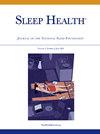Winter sleep extension and fragmentation in a South African agropastoral community
IF 3.4
2区 医学
Q2 CLINICAL NEUROLOGY
引用次数: 0
Abstract
Objectives
To examine seasonal sleep variation and assess the effects of gender, age, and environmental variables (Wet-Bulb Globe Temperature, moonlight, sunrise and sunset times) on sleep in a rural agropastoral community in South Africa with gender division of labor.
Methods
We collected actigraphy data from 114 participants (83 men, 31 women, 4750 nights) during summer and winter seasons in 2023. We used Bayesian hierarchical regression models to investigate drivers of sleep duration and quality.
Results
Total Sleep Time was longer in winter (7.26 hours, SD = 1.0) compared to summer (6.40 hours, SD = 0.88), but so were Fragmentation Index and Wake After Sleep Onset. Higher Wet-Bulb Globe Temperature was associated with shorter Total Sleep Time, higher Fragmentation Index, and lower Sleep Efficiency. Greater moon illumination was correlated with shorter Total Sleep Time and reduced Fragmentation Index and Wake After Sleep Onset. Age was positively correlated with Total Sleep Time and Fragmentation Index among men, and older individuals had earlier sleep onset and offset than younger individuals. Compared to women, men had shorter and more disturbed sleep, especially in the winter, and were more impacted by Wet-Bulb Globe Temperature.
Conclusions
Sleep during the winter season was longer but more fragmented and of lower quality compared to the summer. Seasonal differences in extrinsic weather conditions and perceived risks operated on preexisting gendered labor and sleep disparities to drive seasonal sleep variation in this community. Future research should consider the disproportionate effects that environmental variables can have on sleep outcomes for different groups.
南非农牧社区的冬季睡眠延长和碎片化。
目的:研究南非一个性别分工的农牧社区的季节性睡眠变化,并评估性别、年龄和环境变量(湿球温度、月光、日出和日落时间)对睡眠的影响。方法:我们收集了2023年夏季和冬季114名参与者(83名男性,31名女性,4750晚)的活动记录仪数据。我们使用贝叶斯层次回归模型来研究睡眠时间和质量的驱动因素。结果:冬季总睡眠时间(7.26小时,SD = 1.0)明显长于夏季(6.40小时,SD = 0.88),碎片化指数(Fragmentation Index)和醒后指数(Wake After Sleep Onset)也明显高于夏季(6.40小时,SD = 0.88)。较高的湿球温度与较短的总睡眠时间、较高的碎片指数和较低的睡眠效率有关。月亮光照越强,总睡眠时间越短,碎片指数越低,睡眠后醒来率越低。年龄与男性总睡眠时间和睡眠碎片指数呈正相关,老年人比年轻人更早开始和抵消睡眠。与女性相比,男性的睡眠时间更短、更不安,尤其是在冬天,而且更容易受到湿球温度的影响。结论:与夏季相比,冬季睡眠时间更长,但更零碎,质量更差。外部天气条件和感知风险的季节性差异对先前存在的性别劳动和睡眠差异起作用,从而驱动该社区的季节性睡眠变化。未来的研究应该考虑环境变量对不同人群睡眠结果的不成比例的影响。
本文章由计算机程序翻译,如有差异,请以英文原文为准。
求助全文
约1分钟内获得全文
求助全文
来源期刊

Sleep Health
CLINICAL NEUROLOGY-
CiteScore
6.30
自引率
9.80%
发文量
114
审稿时长
54 days
期刊介绍:
Sleep Health Journal of the National Sleep Foundation is a multidisciplinary journal that explores sleep''s role in population health and elucidates the social science perspective on sleep and health. Aligned with the National Sleep Foundation''s global authoritative, evidence-based voice for sleep health, the journal serves as the foremost publication for manuscripts that advance the sleep health of all members of society.The scope of the journal extends across diverse sleep-related fields, including anthropology, education, health services research, human development, international health, law, mental health, nursing, nutrition, psychology, public health, public policy, fatigue management, transportation, social work, and sociology. The journal welcomes original research articles, review articles, brief reports, special articles, letters to the editor, editorials, and commentaries.
 求助内容:
求助内容: 应助结果提醒方式:
应助结果提醒方式:


